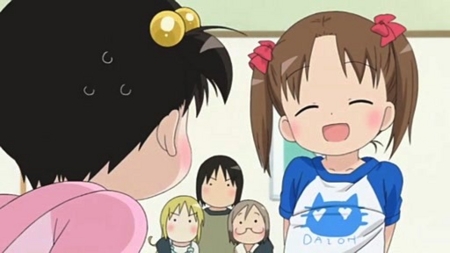Ask John: Where Are the Loli?

Question:
Why hasn’t Strawberry Marshmallow been license rescued? It’s a crime that one of the best slice-of-life moé shows hasn’t been licensed rescued, along with licensing the OVAs. I know Funimation said they don’t really do slice-of-life moé but maybe Sentai Filmworks could relicense it. They’ve in the past rescue licensed Popotan and Rozen Maiden.
Answer:
I don’t want to blow a single point out of proportion, but I do think that it’s telling that practically no loli-centric anime has been licensed for American home video release since domestic publisher Seven Seas canceled its American publishing plans for Kodomo no Jikan in May 2007. Certainly plenty of bishoujo anime has hit domestic DVD in the past years, but shows like Kanokon, Bamboo Blade, Lucky Star, and Strike Witches are distinctly different in tone and focus than anime like Ground Defense Force Mao-chan, St. Tail, Sister Princess, and Ichigo Marshmallow. In May 2007 Seven Seas formally canceled its translation plans for Kaowru Watashiya’s Kodomo no Jikan manga after determining that the manga’s sexual innuendo and implications were too potentially controversial and offensive for American audiences. The opposition to the American release of the series was largely led by the American otaku community that was familiar with the manga and discouraged Seven Seas from publishing the work domestically. That outrage seems to have marked the beginning of an American fan community’s aggressive opposition to manga and anime with a distinctly Lolicon theme.
The Ichigo Marshmallow anime is entirely asexual, yet its TV series has never been re-licensed for American re-distribution. Its OVA series has never been officially released in America at all. And the distribution of the original manga has lapsed in America. Likewise, the totally innocent Ground Defense Force Mao-chan sci-fi comedy from Love Hina creator Ken Akamatsu has not been re-licensed for domestic re-release. Since 2007 the Kodomo no Jikan anime, along with other overt or potential “lolicon” anime Moetan, Nanatsuiro Drops, Cookin’ Idol Ai! Mai! Main!, Animal Tantei Kiruminzu, Astarotte no Omocha!, and Kill Me Baby have not received any official American release. The acclaimed 2009 family film Mai Mai Shinko to Sennen no Mahou, which stars pre-adolescent girls, has not been acquired for domestic distribution. Anime revolving around preadolescent or especially young-looking girls including Moegaku*5, Kaitou Tenshi Twin Angel ~Kyun Kyun Tokimeki Paradise!!~, Hime Chen! Otogi Chikku Idol Lilpri, Mitsudomoe, Tantei Opera Milky Holmes, Yuruyuri, and Hanamaru Youchien have been American online exclusives. Arguably, over the past five years, the only recent anime series starring pre-high school aged girls to be licensed for American home video release have been Sasami: Mahou Shoujo Club and Ro-kyu-bu!
Animal Tantei Kiruminzu was a moderate Japanese cult hit created by Macross creator Shouji Kawamori. Mitsudomoe was a cult hit in both Japan and America. Hanamaru Youchien was animated by Gainax and directed by fan-favorite director Seiji Mizushima. Yet even these relatively high profile shows, with highly marketable pedigrees, haven’t been picked up for domestic DVD release. If Ichigo Marshmallow alone remained unlicensed, the easy hypothesis would be that licensing issues in Japan prevented an American re-release. However, placed in larger context, America’s home video distributors seem to have recognized a trend in domestic purchasing which American otaku themselves haven’t consciously noticed. While the early 2000’s domestic anime market was big enough to support niche genres and themes like anime starring pre-adolescent girls, the post 2008/crash market the support for fringe themes has shrunk to the extent that licensing such anime is no longer commercially viable for American home video release. America does still get home video releases of titles like A-Channel, Hidamari Sketch, and Madoka Magica, which star cute little girls, but those shows star adolescent characters and are targeted at typical otaku viewers rather than fans with a particular lolicon fetish. (Allow me to clarify that a “lolicon fetish” does not necessarily suggest any deviant sexual inclination. Enjoying watching cute little anime girls may be just as innocent as enjoying watching kittens or koala bears.) Regrettably for American otaku with especially varied or eclectic tastes, the contemporary American home video market is simply so small that American distributors largely can’t afford to take risks on styles of anime that aren’t proven popular with American consumers. Anime series like Ichigo Marshmallow, Ground Defense Mao-chan, and Bottle Fairies were niche releases for a very small fringe of American otaku back in 2006 at the height of the American interest in anime. Now, in a drastically smaller consumer market, these sort of anime that only a tiny handful of contemporary American consumers actually buy, are a literal money pit that America’s remaining home video distributors are evidently trying to avoid.

